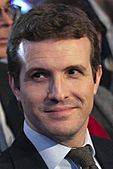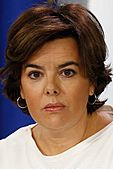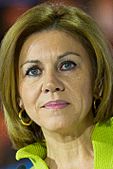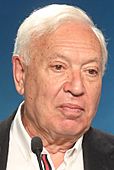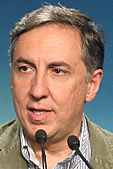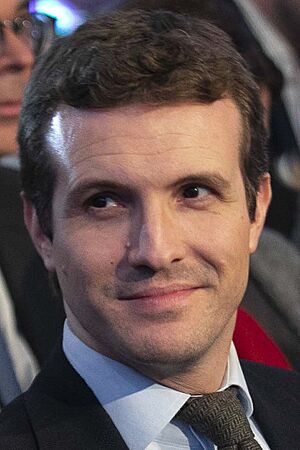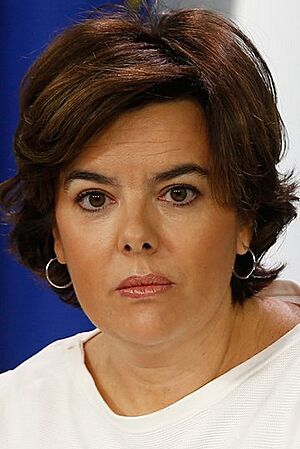19th National Congress of the People's Party (Spain) facts for kids
The 19th National Congress of the People's Party was a big meeting held in Madrid, Spain, from July 20 to 21, 2018. It was a special meeting for the People's Party (PP) to choose a new leader and decide on their plans for the future.
Before the main meeting, a special election was held on July 5. This was the first time that regular members of the PP could directly vote for who they wanted as their leader.
The meeting happened because the former leader, Mariano Rajoy, who was also the Prime Minister of Spain, decided to step down. He resigned after a "no confidence" vote in the government. This meant the party needed to pick a new president.
In the first round of voting on July 5, two candidates got the most votes: Soraya Sáenz de Santamaría, who used to be a deputy prime minister, and Pablo Casado, a vice secretary-general for the party. These two then went on to a final vote at the main congress. Pablo Casado won this final vote. His victory was seen as a move by the party towards more conservative ideas. He also got support from María Dolores de Cospedal, another important party member.

|
|||||||||||||||||||||||||||||||||||||||||||||
|
|||||||||||||||||||||||||||||||||||||||||||||
|
3,082 delegates in the 19th National Congress of the PP Plurality of delegates needed to win |
|||||||||||||||||||||||||||||||||||||||||||||
|---|---|---|---|---|---|---|---|---|---|---|---|---|---|---|---|---|---|---|---|---|---|---|---|---|---|---|---|---|---|---|---|---|---|---|---|---|---|---|---|---|---|---|---|---|---|
| Opinion polls | |||||||||||||||||||||||||||||||||||||||||||||
| Registered | 67,083 (primary) | ||||||||||||||||||||||||||||||||||||||||||||
| Turnout | 58,304 (86.9%) (primary) 2,973 (96.5%) (congress, president) 2,971 (96.4%) (congress, board) |
||||||||||||||||||||||||||||||||||||||||||||
|
|||||||||||||||||||||||||||||||||||||||||||||
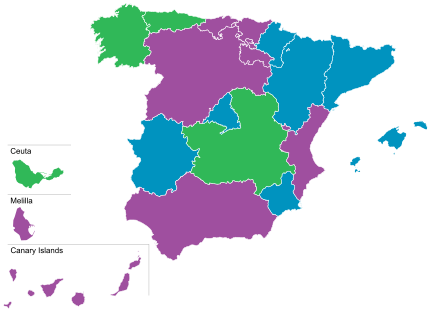
Autonomous community results map
|
|||||||||||||||||||||||||||||||||||||||||||||
|
|||||||||||||||||||||||||||||||||||||||||||||
Contents
What is a Party Congress?
A party congress is the most important meeting for a political party. It can be a regular meeting, held every four years, or a special one, called for important reasons. This 19th Congress was a special one because the party leader had resigned.
The main goals of a congress are to:
- Choose the party's leaders.
- Decide on the party's main goals and plans.
The president of the People's Party is the main leader. This person represents the party and leads its important committees.
How the Leader is Chosen
The way the PP chooses its leader changed in 2017. It now uses a two-step system, similar to some elections in other countries.
Here's how it works:
- Step 1: Primary Election (First Round)
- Any party member who has been a member for at least one year and has paid their fees can try to become president.
- They need to get at least 100 other party members to sign in support of them.
- All registered party members can vote for their favorite candidate in this first round.
- The election happens in 60 areas across Spain.
- Step 2: Congress Vote (Second Round)
- If no candidate wins the first round clearly (meaning they don't get at least 50% of the national vote, win in half of the areas, and have a big lead), then a second round happens.
- In this second round, special "delegates" from the party vote. These delegates are chosen by party members at the same time as the first round of voting.
- The delegates choose the new leader from the two candidates who got the most votes in the first round.
Important Dates for the Election
Here are the key dates for this special election:
- June 11: The congress was officially announced. Party members could start signing up to vote.
- June 18: Candidates could start putting their names forward.
- June 20: The deadline for candidates to submit their names.
- June 22: The official list of candidates for president was announced.
- June 23: Candidates started their campaigns to get votes from party members.
- June 25: The deadline for party members to register to vote.
- June 29: The deadline for party members to sign up to be delegates.
- July 4: The last day for campaigning.
- July 5: Primary Election! This was the first round of voting where all registered party members voted. Delegates for the congress were also chosen.
- July 20-21: Party Congress! If needed, the final vote for the party leader happened among the delegates.
Who Wanted to Be Leader?
Many people wanted to become the new leader of the People's Party. Here are the main candidates:
The Winner
- Pablo Casado (born 1981): He was a vice secretary-general for the party and a member of the Spanish Parliament for Ávila. He was elected as the new president.
Advanced to the Final Vote
- Soraya Sáenz de Santamaría (born 1971): She was a member of the Spanish Parliament for Madrid and used to be the Deputy Prime Minister of Spain. She made it to the final vote but did not win.
Other Candidates in the First Round
These candidates got enough support to run in the first round but did not get enough votes to move on to the final round:
- Elio Cabanes (born 1974): A city councilor from La Font de la Figuera.
- María Dolores de Cospedal (born 1965): She was the Secretary-General of the PP and a member of the Spanish Parliament for Toledo. She also used to be the Minister of Defence.
- José Manuel García-Margallo (born 1944): A member of the Spanish Parliament and former Minister of Foreign Affairs.
- José Ramón García-Hernández (born 1971): A member of the Spanish Parliament for Ávila and Madrid.
People Who Decided Not to Run
Some other important party members were thought to be possible candidates, but they decided not to run:
- Alfonso Alonso
- José Ramón Bauzá
- Cristina Cifuentes
- Íñigo de la Serna
- Alberto Núñez Feijóo
- Ana Pastor
- Mariano Rajoy
How Many People Supported Each Candidate?
To run for president, each candidate needed at least 100 signatures from party members. Here's how many endorsements each candidate received:
| Candidate | Endorsements | ||
|---|---|---|---|
| Count | % V | ||
| Pablo Casado | ~5,000 | ~54.23 | |
| María Dolores de Cospedal | 3,336 | 36.18 | |
| José Manuel García-Margallo | ~500 | ~5.42 | |
| Elio Cabanes | 140 | 1.52 | |
| Soraya Sáenz de Santamaría | >100 | >1.08 | |
| José Ramón García-Hernández | >100 | >1.08 | |
| José Luis Bayo | 44 | 0.48 | |
| Total | >9,220 | ||
| Sources | |||
| Endorsements by party members | ||||
|---|---|---|---|---|
| Casado | 54.23% | |||
| Cospedal | 36.18% | |||
| García-Margallo | 5.42% | |||
| Cabanes | 1.52% | |||
| Santamaría | 1.08% | |||
| G.Hernández | 1.08% | |||
| Bayo | 0.48% | |||
Election Results
Here are the final results of the election:
Overall Results
| Candidate | Primary | Congress | |||||
|---|---|---|---|---|---|---|---|
| President | Board | ||||||
| Votes | % | Votes | % | Votes | % | ||
| Pablo Casado | 19,954 | 34.27 | 1,701 | 57.29 | 1,689 | 56.91 | |
| Soraya Sáenz de Santamaría | 21,512 | 36.95 | 1,250 | 42.10 | 1,251 | 42.15 | |
| María Dolores de Cospedal | 15,092 | 25.92 | Eliminated | ||||
| José Manuel García-Margallo | 688 | 1.18 | Eliminated | ||||
| José Ramón García-Hernández | 671 | 1.15 | Eliminated | ||||
| Elio Cabanes | 185 | 0.32 | Eliminated | ||||
| Blank ballots | 119 | 0.20 | 18 | 0.61 | 28 | 0.94 | |
| Total | 58,221 | 2,969 | 2,968 | ||||
| Valid votes | 58,221 | 99.86 | 2,969 | 99.87 | 2,968 | 99.90 | |
| Invalid votes | 83 | 0.14 | 4 | 0.13 | 3 | 0.10 | |
| Votes cast / turnout | 58,304 | 86.91 | 2,973 | 96.46 | 2,971 | 96.40 | |
| Abstentions | 8,779 | 13.09 | 109 | 3.54 | 111 | 3.60 | |
| Registered voters | 67,083 | 3,082 | 3,082 | ||||
| Sources | |||||||
| Vote by party members | ||||
|---|---|---|---|---|
| Santamaría | 36.95% | |||
| Casado | 34.27% | |||
| Cospedal | 25.92% | |||
| García-Margallo | 1.18% | |||
| G.Hernández | 1.15% | |||
| Cabanes | 0.32% | |||
| Blank ballots | 0.20% | |||
| Vote by delegates (President) | ||||
|---|---|---|---|---|
| Casado | 57.29% | |||
| Santamaría | 42.10% | |||
| Blank ballots | 0.61% | |||
| Vote by delegates (Board) | ||||
|---|---|---|---|---|
| Casado | 56.91% | |||
| Santamaría | 42.15% | |||
| Blank ballots | 0.94% | |||
See also
 In Spanish: XIX Congreso del PP para niños
In Spanish: XIX Congreso del PP para niños


